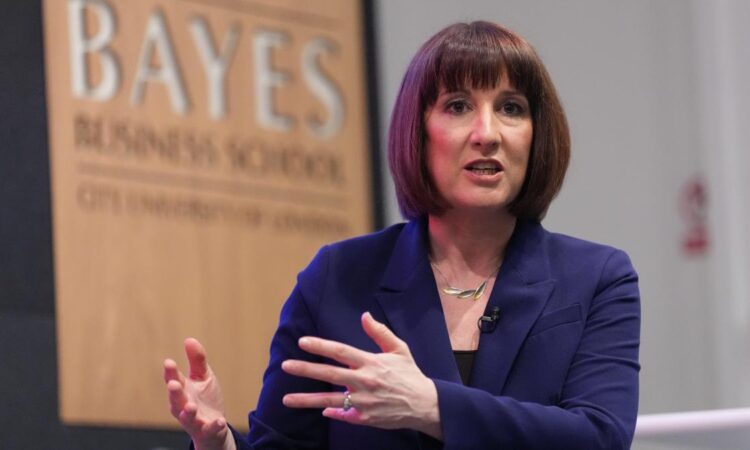
Labour will alter Chancellor Jeremy Hunt’s fiscal rule on borrowing in a bid to boost investment into Britain, Rachel Reeves said.
The shadow chancellor used a speech lasting close to an hour to set out her vision if Labour wins the general election widely expected this year.
During the annual Mais Lecture in the City of London on Tuesday, Ms Reeves said Britain needs a “fundamental course correction” to improve living standards and guard the “health of our democracy”.
She said the country “cannot continue with the short-termist approach that disregards the importance of public investment”, as she vowed to focus on delivering growth if she becomes chancellor.
“That is why our fiscal rules differ from the Government’s,” she said.
“Their borrowing rule, which targets the overall deficit rather than the current deficit, creates a clear incentive to cut investment that will have long-run benefits for short-term gains.
“I reject that approach, and that is why our borrowing rule targets day-to-day spending.
“We will prioritise investment within a framework that would get debt falling as a share of GDP over the medium term.”
Chancellors will only be able to scrap fiscal rules in future if the Budget watchdog, the Office for Budget Responsibility (OBR), declares that the UK is in “an economic crisis”, she added.
Ms Reeves said that Labour would also ask the OBR to “report on the long-term impact of capital spending decisions” as part of its remit.
She committed to upholding Mr Hunt’s rule that debt must be falling as a share of the economy by the fifth year of a forecast.
The former Bank of England economist also proposed reforms to the Treasury that will increase the role of the department’s enterprise and growth unit – originally created by New Labour – so it is “embedded in the existing fiscal event process”.
During the lecture, Ms Reeves said that Britain stands “at an inflection point” like it did “at the end of the 1970s”, a period that paved the way for Margaret Thatcher’s premiership and her sweeping economic reforms, including moves towards the privatisation of public services.
Ms Reeves said that “unlike the 1980s, growth in the years to come must be broad-based, inclusive, and resilient”, as she stressed that she remained “an optimist” about confronting the country’s challenges.
Asked after her speech what she meant by her reference to the late 1970s, Ms Reeves said she joined Labour “because I disagreed with what so much of what Margaret Thatcher did to Britain” but said there were parallels between the year she came to power and now.
“What I’m arguing in the speech is that 1979 was point when the country had to make a big choice, and they made the choice,” Ms Reeves said.
“What I’m arguing today is that there was a similar moment, after a period of sclerotic growth and high inflation, of what direction our country goes in.
“And at the next election, the choice is between five more years of chaos and instability versus the stability, the investment and reform that I’ve set out this evening.”

She said voters could expect a “different type of growth” under Labour compared with the “deindustrialised strategy” advanced by Baroness Thatcher and her former chancellor Nigel Lawson.
“I wouldn’t draw the parallels too much,” she said.
One union chief was critical of the shadow chancellor’s focus on sticking to “phoney” fiscal rules.
Unite general secretary Sharon Graham said: “Labour needs to be focused on delivering good jobs, public services and dignity in retirement, not more rhetoric about abstract economic concepts, like GDP growth.
“If you stick to phoney fiscal rules, rule out taxing the wealthy and pander to the profiteers, you end up in a straitjacket of your own making.
“Ripping up building regulations and tinkering in the public sector are not going to deliver serious growth – that’s for the birds. Only sustained long-term public investment in our crumbling infrastructure can turn the tide on decline.
“It’s time Labour came up with a plan for the real economy rather than the big business lobby.”






